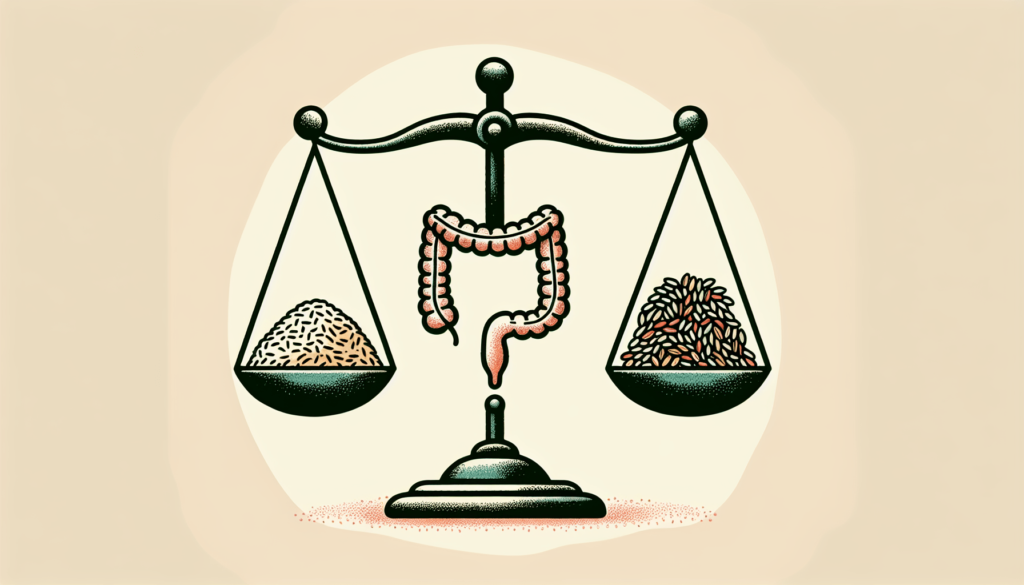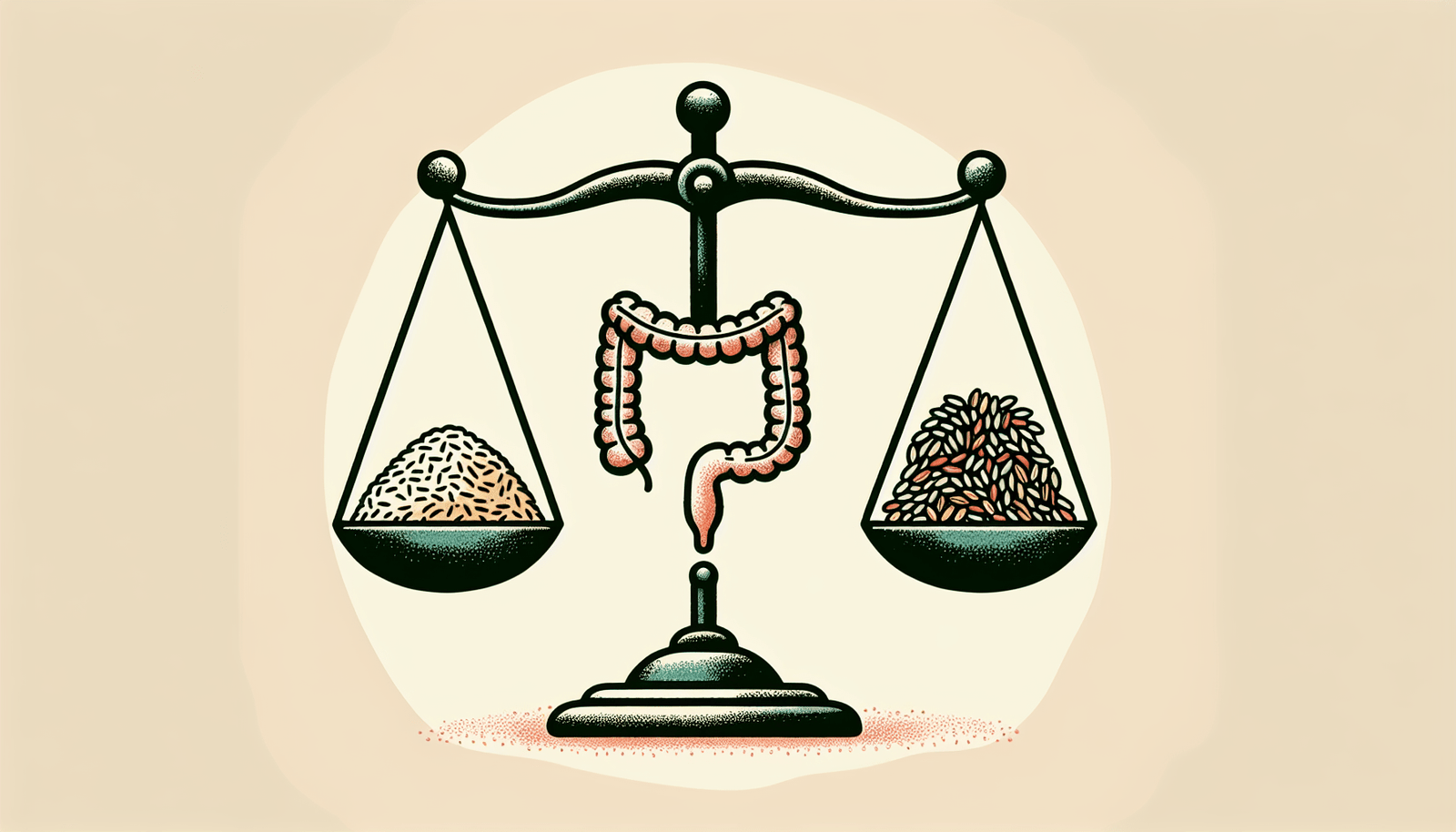In this article, we will explore the topic of whole grains and the impact they can have on individuals with specific gut conditions. With numerous health benefits often associated with whole grains, it is important to determine if there are any exceptions for those who may have certain digestive sensitivities. By examining the potential effects of different whole grains on various gut conditions, we aim to provide valuable insights to help you make informed decisions about your dietary choices. Whether you are looking to optimize your gut health or simply curious about the relationship between whole grains and specific gut conditions, this article will provide you with the information you need.

Whole Grains and Gut Health
When it comes to maintaining a healthy gut, incorporating whole grains into your diet can play a significant role. Whole grains are packed with important nutrients like fiber, vitamins, and minerals that promote good digestion and overall gut health. Understanding the benefits of whole grains and their effect on the gut is essential for making informed dietary choices.
Understanding Whole Grains
Whole grains refer to grains that retain all three parts of the grain kernel: the bran, germ, and endosperm. These parts contain essential nutrients such as fiber, B vitamins, vitamin E, magnesium, and iron. Examples of whole grains include brown rice, quinoa, oats, and whole wheat. Choosing whole grain products over refined grains is important as refined grains have had their bran and germ removed, resulting in a loss of valuable nutrients.
Importance of Gut Health
Maintaining a healthy gut is crucial for overall well-being. The gut, also known as the gastrointestinal tract, is responsible for digestion and nutrient absorption. A balanced gut microbiome, which is the collection of microorganisms living in the gut, is essential for proper digestion, immune function, and even mental health. An unhealthy gut can lead to various gastrointestinal conditions such as irritable bowel syndrome (IBS), inflammatory bowel disease (IBD), and celiac disease. Incorporating whole grains into your diet can support gut health and help prevent or manage these conditions.
Gut Conditions and Dietary Restrictions
Various gut conditions can impact an individual’s dietary choices and restriction. Some of the common gut conditions include irritable bowel syndrome (IBS), inflammatory bowel disease (IBD), and celiac disease. Understanding these conditions and their dietary restrictions is crucial in making informed decisions about whole grain consumption.
Common Gut Conditions
Irritable bowel syndrome (IBS) is a common gastrointestinal disorder characterized by symptoms like abdominal pain, bloating, and changes in bowel habits. Inflammatory bowel disease (IBD) refers to a group of chronic conditions that cause inflammation in the digestive tract, including Crohn’s disease and ulcerative colitis. Celiac disease, on the other hand, is an autoimmune disorder triggered by consuming gluten. Gluten is a protein found in grains like wheat, barley, and rye. Individuals with celiac disease must strictly avoid gluten-containing grains.
Dietary Restrictions and Considerations
For individuals with gut conditions like IBS, it’s important to identify and avoid trigger foods that can exacerbate symptoms. These trigger foods can vary from person to person, but common culprits include certain types of whole grains, such as wheat or barley. For individuals with IBD, it’s crucial to follow a low-residue diet during flare-ups, which may limit the consumption of whole grains. Those with celiac disease must strictly avoid gluten-containing grains and opt for gluten-free alternatives.
Whole Grains and Their Effect on Gut Conditions
While whole grains offer numerous health benefits, it’s important to consider their potential impact on gut conditions. Different grains can have varying effects on individuals depending on their specific gut condition and tolerance.
Potential Impact on Gut Conditions
Some individuals with gut conditions may find that whole grains exacerbate their symptoms. For example, in individuals with IBS, certain whole grains high in fiber, such as bran and wheat germ, can cause bloating and gas. However, it’s important to note that everyone’s response to these grains can vary, and some individuals with gut conditions may tolerate them well. Listening to your body and being mindful of how different grains affect your gut is crucial.
Studies and Research Findings
Research on the relationship between whole grains and gut health is still evolving. While some studies suggest that whole grains can have a positive impact on gut health, more research is needed to fully understand the mechanisms behind this relationship. However, it’s clear that incorporating a variety of whole grains into a balanced diet can provide important nutrients that support overall gut health.
Whole Grains Suitable for Most Gut Conditions
Several whole grains are generally well-tolerated and suitable for most individuals with gut conditions. These grains offer nutritional benefits and are less likely to cause adverse reactions.
Brown Rice
Brown rice is a nutritious whole grain that is easy to digest and gentle on the gut. It is a great source of fiber, B vitamins, and minerals like magnesium and selenium. Brown rice can be enjoyed as a side dish, in grain bowls, or used as a base for stir-fries.
Quinoa
Quinoa is a versatile and protein-rich whole grain that provides essential amino acids. It is easy to digest and contains fiber, iron, and magnesium. Quinoa can be used as a base for salads, served as a side dish, or incorporated into baked goods.
Steel-Cut Oats
Steel-cut oats are a type of whole grain that undergoes minimal processing, making them a nutritious choice for individuals with gut conditions. They are a great source of soluble fiber, which can promote healthy digestion. Steel-cut oats can be cooked and enjoyed as a warm breakfast porridge or incorporated into baked goods.

Whole Grains to Approach with Caution
While some whole grains are generally well-tolerated, there are a few that individuals with gut conditions may need to approach with caution. These grains may be higher in fiber or have other properties that can potentially trigger symptoms in certain individuals.
Bran and Wheat Germ
Bran and wheat germ, which are often added to cereals and baked goods for added fiber, can be problematic for some individuals with gut conditions. These parts of the grain contain more fiber and can cause bloating and discomfort in sensitive individuals. It’s advisable to start with small amounts and gradually increase intake to assess tolerance.
Barley
Barley is a nutritious whole grain that contains fiber, vitamins, and minerals. However, for individuals with gut conditions, the high fiber content in barley can be problematic. It’s important to monitor symptoms and consult with a healthcare professional if necessary.
Rye
Rye is another grain that individuals with gut conditions may need to approach with caution. Rye contains a type of fiber called fructans, which can cause digestive symptoms in sensitive individuals. It’s advisable to limit rye consumption or opt for gluten-free alternatives.
Whole Grains to Avoid for Specific Gut Conditions
Certain gut conditions necessitate the avoidance of specific whole grains due to their impact on symptoms and overall health. It’s important to be aware of these restrictions and opt for suitable alternatives.
Celiac Disease and Gluten Intolerance
Individuals with celiac disease and gluten intolerance must strictly avoid gluten-containing grains, including wheat, barley, and rye. These grains contain gluten, which triggers an immune response in individuals with these conditions. Instead, individuals with celiac disease or gluten intolerance can opt for gluten-free grains like rice, corn, quinoa, and gluten-free oats.
Inflammatory Bowel Disease
For individuals with inflammatory bowel disease (IBD), certain whole grains may aggravate symptoms during flare-ups. It’s essential to work closely with a healthcare professional to develop an individualized diet plan. During flare-ups, opting for low-fiber grains like white rice and refined grains may be more suitable. However, during remission, whole grains can be reintroduced gradually and monitored for any adverse effects.
Irritable Bowel Syndrome
Individuals with irritable bowel syndrome (IBS) often experience symptoms like abdominal pain and changes in bowel habits in response to certain foods. Whole grains that are high in fiber, such as bran and wheat germ, can potentially worsen symptoms in some individuals with IBS. Experimenting with different types of grains and monitoring symptoms can help identify which whole grains are well-tolerated.
Alternatives to Whole Grains
For individuals with gut conditions that restrict whole grain consumption, there are several alternatives available that can provide similar nutritional benefits.
Gluten-Free Grains
For individuals with celiac disease or gluten intolerance, gluten-free grains like rice, corn, quinoa, and gluten-free oats are suitable alternatives. These grains are naturally gluten-free and can be incorporated into a wide range of recipes.
Vegetables and Legumes
Vegetables and legumes are excellent sources of fiber, vitamins, and minerals. They can provide similar benefits to whole grains in supporting gut health. Examples include broccoli, kale, lentils, chickpeas, and black beans. These can be enjoyed in salads, soups, stir-fries, or as side dishes.
Nut and Seed Flours
For individuals with gut conditions that restrict grain consumption, nut and seed flours can be a great alternative. Almond flour, coconut flour, and flaxseed meal are popular options that can be used in baking and cooking. These flours are naturally gluten-free and provide a good source of healthy fats and protein.
Tips for Incorporating Whole Grains in a Gut-Friendly Diet
If you have a gut condition and want to incorporate whole grains into your diet, there are a few tips to keep in mind to ensure a gut-friendly approach.
Soaking and Sprouting Grains
Soaking or sprouting grains before cooking can help reduce the level of anti-nutrients and make them more digestible. This process can also enhance the bioavailability of certain nutrients. Experiment with soaking or sprouting techniques to see if it improves your tolerance to whole grains.
Managing Portion Sizes
Portion sizes play a crucial role in maintaining a healthy gut. Even if a particular whole grain is well-tolerated, it’s important not to overconsume it. Balancing your plate with a variety of foods, including vegetables, protein, and healthy fats, is essential for overall gut health.
Balancing with Other Nutrients
To ensure a well-rounded gut-friendly diet, it’s important to balance whole grain consumption with other nutrients. Incorporate lean proteins, fruits, vegetables, and healthy fats into your meals to provide a diverse range of nutrients and support your gut health.
Consulting a Healthcare Professional
If you have a gut condition and are unsure about incorporating whole grains into your diet, it’s always advisable to consult a healthcare professional. They can provide personalized advice based on your specific condition, symptoms, and nutritional needs. A registered dietitian or gastroenterologist can help you develop an individualized plan.
Individualized Advice
Every individual is unique, and what works for one person may not work for another. A healthcare professional can evaluate your gut health, assess your dietary needs, and provide individualized advice. This will ensure that your dietary choices align with your specific gut condition and overall health goals.
Professional Guidance
As research on gut health and whole grains continues to evolve, seek professional guidance to stay updated and informed. A healthcare professional can help interpret the latest research findings and provide evidence-based recommendations for a gut-friendly diet that suits your specific needs.
Conclusion
When it comes to gut health, incorporating whole grains into your diet can be beneficial. However, individuals with certain gut conditions need to be mindful of their choices. While some whole grains are suitable for most gut conditions, others may need to be approached with caution or avoided altogether. It’s important to listen to your body, monitor symptoms, and consult with a healthcare professional to develop a personalized approach to gut health. Finding the right balance between whole grains and other gut-friendly foods is key to supporting your overall well-being.

